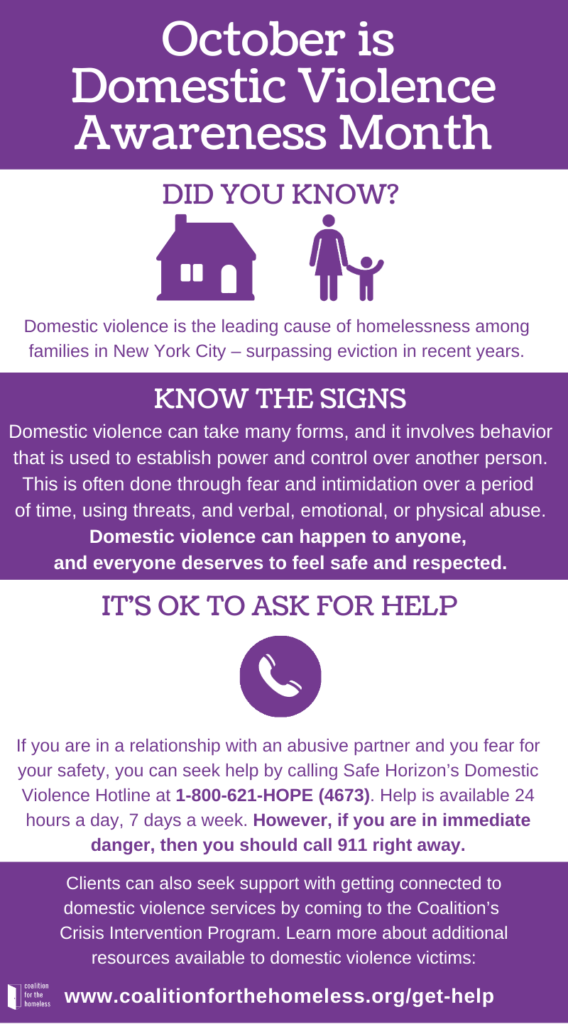October is Domestic Violence Awareness Month. Every day, countless New Yorkers experience domestic violence, and many survivors struggle to find stability after they leave an abusive relationship. In recent years, domestic violence has surpassed eviction as the leading cause of homelessness among families in New York City.
This week, Comptroller Scott Stringer released a report calling for the City and State to make further investments and policy changes to better support the growing number of survivors of domestic violence who experience homelessness. The City’s Human Resources Administration oversees a shelter system for survivors of domestic violence, but there are not always vacant beds available that meet a survivor’s needs and there is a limit to how long people can stay in domestic violence shelters. If people are unable to secure permanent housing at the end of their stay in a domestic violence shelter, they may enter the City’s larger shelter system operated by the Department of Homeless Services (DHS). The Comptroller’s report highlights that in Fiscal Year 2018, domestic violence accounted for 41 percent of the family population entering DHS shelters. In order to break the cycle of instability that too many survivors face, the City must create more permanent, affordable housing for homeless New Yorkers, including those who have experienced domestic violence.
Coalition for the Homeless Policy Director Giselle Routhier commended Comptroller Stringer for drawing attention to the link between domestic violence and homelessness:
“Comptroller Stringer highlights an important driver of homelessness among families: domestic violence combined with a lack of available and safe housing options. The most important thing we can do to support families fleeing violence is to make sure they do not languish in shelters for long periods of time, but rather are helped to move into stable permanent housing as soon as possible. As the Comptroller recommends, the Mayor must expand the supply of housing available for homeless families and individuals, including the rising number fleeing violence at home, by increasing the number of new apartments built for homeless households under Housing New York 2.0.”
Noah Manskar wrote about the Comptroller’s report for Patch:
“It’s hard to find affordable housing in this city, but when you’re dealing with trauma, trying to heal and take care of your children’s health too, it’s even harder,” Stringer, a Democrat, said at a news conference.
Domestic violence drove about 12,500 people in more than 4,400 families to shelters run by the city’s Department of Homeless Services in the 2018 fiscal year, the comptroller’s report found, up 37 percent and 44 percent from 2014, respectively. That figure includes some 7,000 children, more than half of whom were younger than 6, Stringer’s office says.
The families accounted for 41 percent of those who entered shelters that year, making domestic violence the most common reason for family homelessness, Stringer’s report says.
…
But beneath all the wonky details is a dire need for more homes for the most vulnerable New Yorkers — which de Blasio has failed to deliver, Stringer said. He repeated his call for the city to triple the number of affordable homes set aside for homeless people.
“We will not reduce record homelessness without building more housing,” said Giselle Routhier, the policy director at the Coalition for the Homeless. “… That’s going to help everyone who’s homeless, including the rising number of people who are fleeing domestic violence in their homes.”
If you are in a relationship with an abusive partner and you fear for your safety, you can seek help by calling Safe Horizon’s Domestic Violence Hotline at 1-800-621-HOPE (4673). Help is available 24 hours a day, 7 days a week. However, if you are in immediate danger, then you should call 911 right away. Clients can also seek support with getting connected to domestic violence services by coming to the Coalition’s Crisis Intervention Program.
